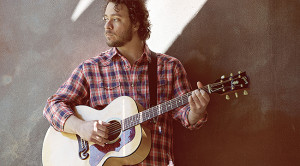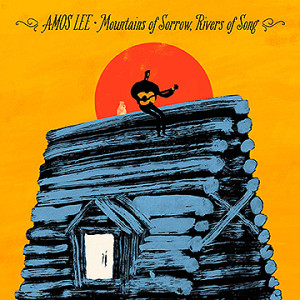Amos Lee: Living with the albums

Produced by Jay Joyce (Emmylou Harris, Eric Church, Cage the Elephant), Amos Lee’s Mountains of Sorrow, Rivers of Song is a beautifully recorded album that shows off his soulful vocals. Right from the opening chords of the somber ballad “Johnson Blvd.,” Amos Lee sounds like he’s channeling classic rock moves. The songs have a natural air to them. We reached the cordial Philadelphia native via phone from San Francisco where he said he was “visiting friends and getting out of the polar vortex.” His winter tour begins later this month.
Mountains of Sorrow, Rivers of Song has an epic feel to it like it’s from the ’70s. Talk about the writing and recording process. Was it a difficult album to make?
In my teenage years, I was always into albums. My first albums were cassettes. I worked at a South Carolina record store for a couple of years. All we sold was vinyl. We sold mostly classic jazz, but we also sold soul music, gospel, country, old rock ’n’ roll . . . all really good stuff. We were allowed to take home [a record], listen to it and then bring it back. That was the perk of the job. I spent tons of time listening to an album. It’s a commitment to put a record on. Just that physicality of putting that record on made you listen to it a bit more. Listening to music in 2014 is just different. People are distracted. There’s a niche of people who have record players and are playing vinyl but, as a whole, there aren’t many people who have the stereo system as the centerpiece of their home. I don’t know many people who have stereo systems; they might have an MP3 player in the corner. I don’t fault anyone for the way they want to connect with their fans. Ultimately, the people getting the music are the ones who keep this conversation going. But I wish people made the time to really live with records. Like back in the day when we would buy a CD and listen to it in our car. Now, we have the entire catalogue of music at our fingertips at all time. I have everything that’s amazing that’s ever been recorded. It makes it easier to go, “This doesn’t crush me right now so I’m going to move on.” It limits a little bit the way that people can dig deeper into an album. I remember when [Hall & Oates’] Abandoned Luncheonette came out. I would listen to “She’s Gone” over and over or side A or side B over and over again. I fell in love with so many songs because I lived with the album.
It seems like you took an old-school approach to recording the album.
That’s been my MO the whole time. I’m still a romantic with that kind of stuff. I think about people being in a room together and making music. It seems to me if I’m sitting with some engineers in a studio that philosophically that’s the way to do it. We all agree that it’s the coolest way to do it. When we deliver the masters, the labels want perfection because they want to keep up with the Joneses. It doesn’t need to be perfect. We don’t have to synchronize the bass notes and make sure the high hats are on time. You don’t have to synchronize everything. You go back and listen to anything from before Pro Tools and you realize that some of the guys were fucking up. Not all of them. The level of musicianship was really high. But they didn’t have engineers and ProTools people. You listen to what Bobby Charles did with The Band. It’s super loose. There’s plenty of stuff that may not be quote, unquote right but it feels so damn good.
 I love the drawing on the cover. Where did that come from?
I love the drawing on the cover. Where did that come from?
It’s really beautiful. We were looking at artists and thinking about illustrators. We came across this cat. I really like the stuff that Bob Dylan did for [The Band’s] Music from Big Pink, the more abstract-y kind of stuff. I liked the vibe of that stuff. I love the cover. It’s beautiful. I wish I could draw.
I read that it was a John Prine album that made you want to become a musician. Is that true?
Umm . . . let’s put it this way. When I was writing songs, there were a bunch of records that really turned me on but for some reason, every time I went to a show, somebody was covering “Angel from Montgomery.” I thought it was crazy. Someone is always playing this song. He’s an inspiration.
Did you know early on you could sing?
I’m still not sure. People respond to it. It’s sort of a weird thing for me. I sing along with records but it’s not something I think about as something I’m good at. I think of it as something I do. I was talking to a friend of mine last week about how it’s a crazy time in history when someone with such a limited skill set can make a living. If it was 1600 or 1700, I’d be having a good time singing in a corner of the bar. Those guys didn’t live long. You didn’t get paid money. You got paid in favors. I think about it like that. It’s essential to my life but I think it’s as much about this time in history. The connection I have to it is that it’s always been something that’s united people. No matter what. You come together through these songs. You sit around and it’s something you can do together. That’s how I approach it.
Your last album seemed to really connect with listeners. What about it do you think resonated so much with your fans?
I’m not sure. I think there’s a mystery to all of that. Why one song feels so good to one person and not to the next. One thing I’ve learned is not to take it personally when someone doesn’t like what you do. There’s no memorandum that says everyone has to like it. Yeah, it’s very important and emotional but it doesn’t mean that everybody has to like it. I feel grateful that anyone does. I’m not sure why. We share a common aesthetic because of the music we came up listening together.
You’ve said your touring band really came together on the last tour. What was the key to making that happen?
Commitment, for sure. Just sticking with each other and believing in each other. That’s kind of what it comes down to.
You’ve said Mountains of Sorrow, Rivers of Song is the most balanced album you’ve made. Explain that a bit.
I have to retract that statement. I’m not sure it is. I’m not sure it is in the long run. I think the effort was put forth for us to create the balance of light and dark and all that stuff. Some songs are more fun and some are more serious.
Can you talk about the charity organization Musicians on Call a bit?
That’s something I’ve been involved with. I started through WXPN in Philadelphia. We go into hospitals and play in rooms for people. I’ve been to veterans’ and children’s hospitals. We donated to bring music to people who want it in their lives and maybe aren’t well enough to leave the facility they’re in.
Looks like you have a busy summer lined up. Talk about what you’re looking forward to.
I know this is going to cliché, but I look forward to all of it. To me, every single one of those gigs is another place where I can connect with people. This summer, I’m looking at it holistically. I treat every gig like it’s the most important gig because frankly it is. Every show you want to be great. People are paying their hard-earned money and I know that in these times, that’s no light thing. It’s like if you worked at a kitchen in a restaurant and someone said, “I’m only going to pay attention for a few of my tickets that are up.” That restaurant wouldn’t stay in business. Every person who comes to my show is someone I want to give one hundred percent of my attention to.
Upcoming 2014 Tour Dates
Feb 15
Feb 16
Feb 17
Feb 19
Feb 21
Feb 22
Feb 25
Feb 27
Feb 28
March 1
March 3
March 4
March 5
March 7
March 8
March 9
April 3
April 4
April 5
April 7
April 8
April 11
April 12
April 13
April 15
April 17
April 18
April 19
McDonald Theatre – Eugene, OR
Arlene Schnitzer Concert Hall – Portland, OR
Paramount Theatre – Seattle, WA
Fox Theater – Oakland, CA
The Wiltern – Los Angeles, CA
Balboa Theatre – San Diego, CA
The Smith Center For The Performing Arts – Las Vegas, NV
Austin City Limits Live At The Moody Theater – Austin, TX
Bayou Music Center – Houston, TX
Majestic Theatre – Dallas, TX
Gillioz Theatre – Springfield, MO
Uptown Theatre – Kansas City, MO
Sheldon Concert Hall – St. Louis, MO
Taft Theatre – Cincinnati, OH
Lakewood Civic Auditorium – Lakewood, OH
Kalamazoo State Theatre – Kalamazoo, MI
The Plaza Live – Orlando, FL
Parker Playhouse – Ft. Lauderdale, FL
Ruth Eckerd Hall – Clearwater, FL
Florida Theater – Jacksonville, FL
Johnny Mercer Theatre – Savannah, GA
Township Auditorium – Columbia, SC
Ovens Auditorium – Charlotte, NC
The Classic Center – Athens, GA
Carpenter Theatre At Richmond Center Stage – Richmond, VA
Count Basie Theatre – Red Bank, NJ
Borgata Hotel Casino & Spa – Music Box – Atlantic City, NJ
Capitol Theatre – Port Chester, NY











